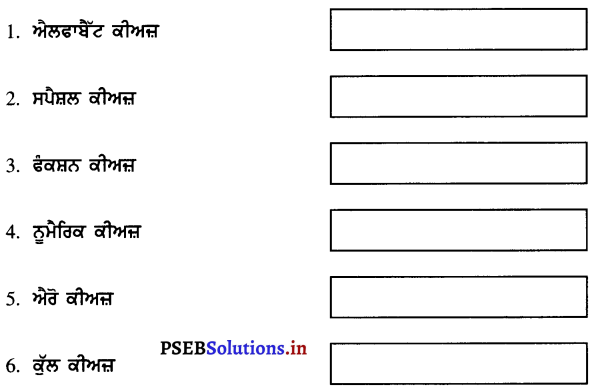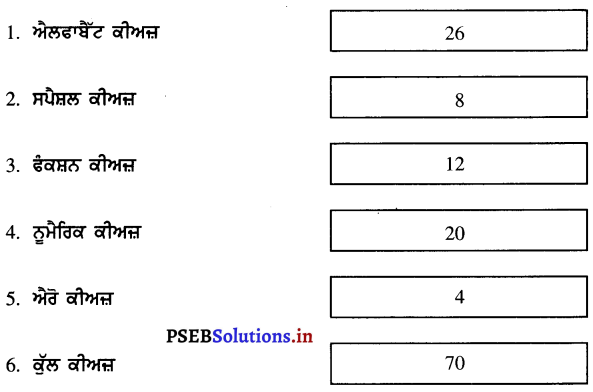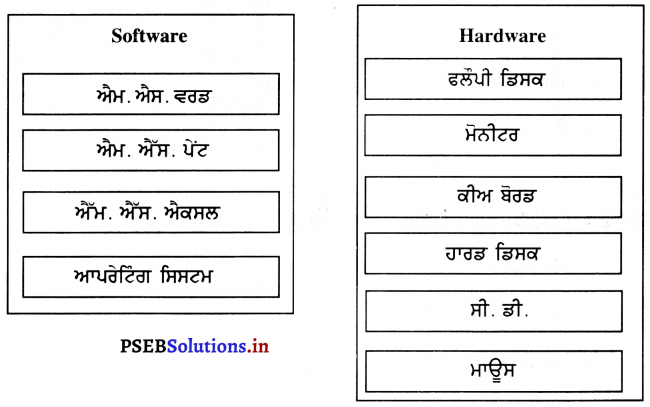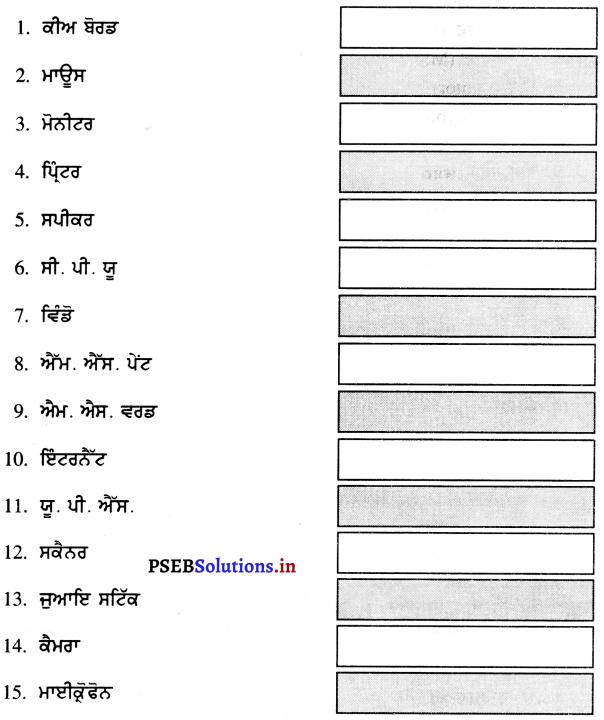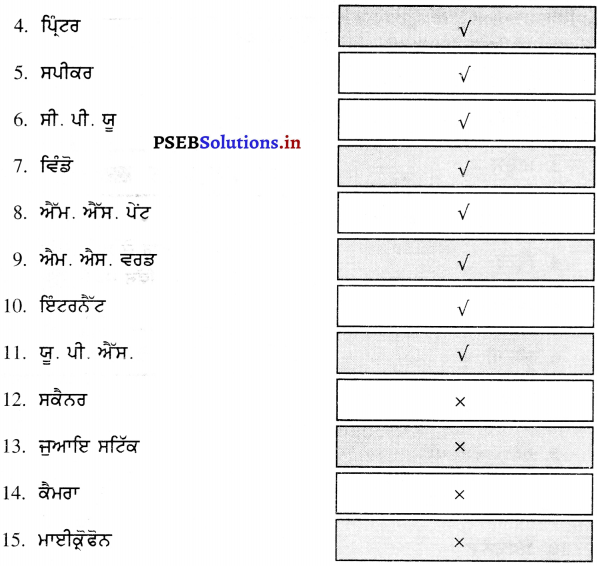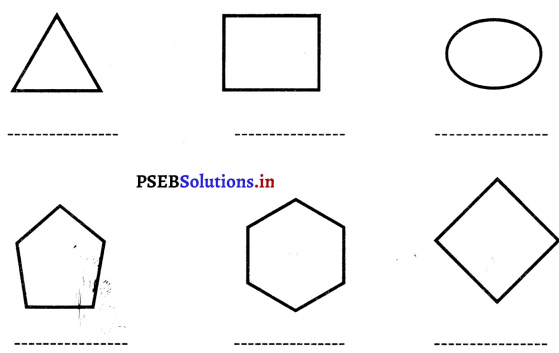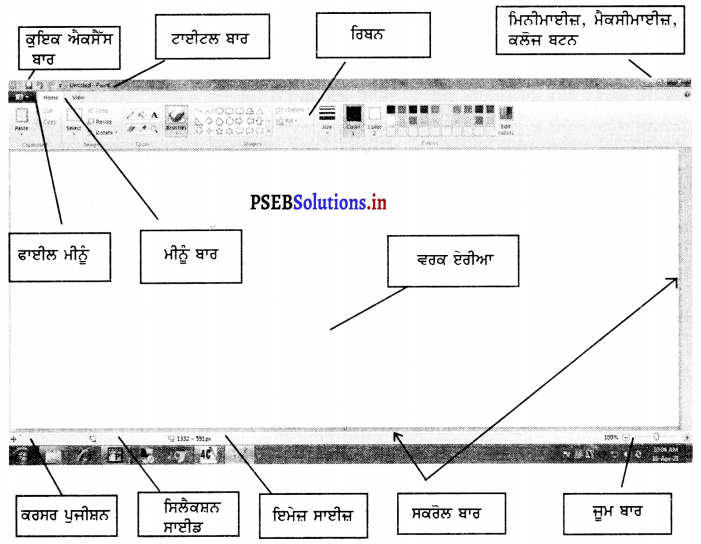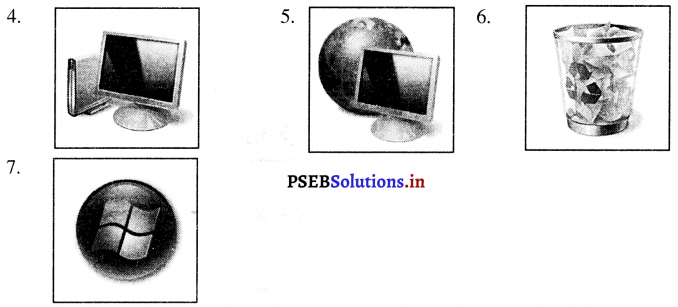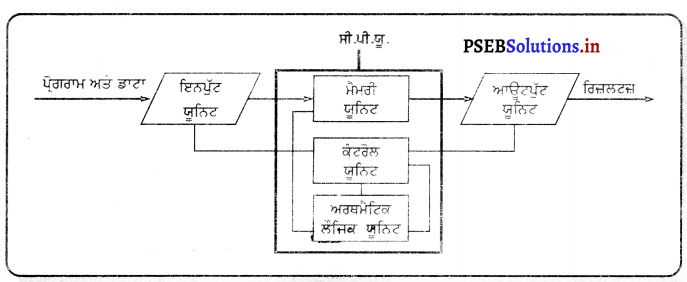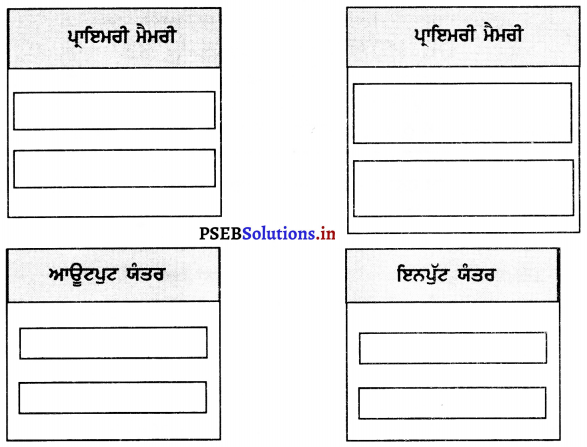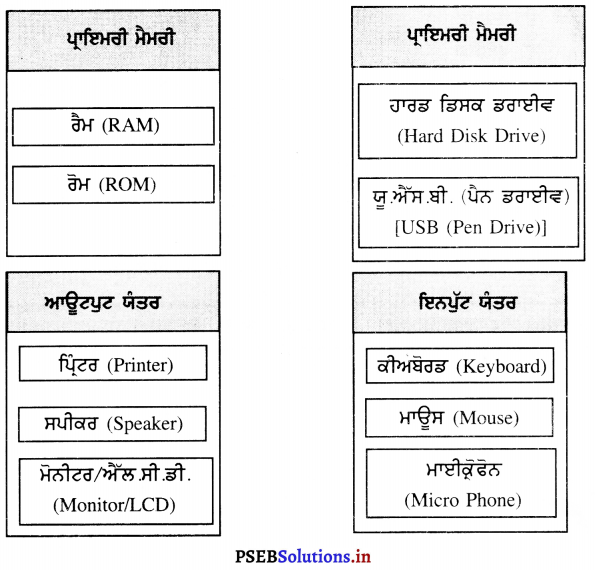Punjab State Board PSEB 6th Class Computer Book Solutions Chapter 8 ਆਊਟਪੁੱਟ ਯੰਤਰ Textbook Exercise Questions and Answers.
PSEB Solutions for Class 6 Computer Chapter 8 ਆਊਟਪੁੱਟ ਯੰਤਰ
Computer Guide for Class 6 PSEB ਆਊਟਪੁੱਟ ਯੰਤਰ Textbook Questions and Answers
ਅਭਿਆਸ ਦੇ ਪ੍ਰਸ਼ਨ-ਉੱਤਰ
1. ਖ਼ਾਲੀ ਥਾਂਵਾਂ ਭਰੋ
(i) ਮੋਨੀਟਰ ਇਕ ਸਾਫਟ ਕਾਪੀ ਅਤੇ …………………… ਇੱਕ ਹਾਰਡ ਕਾਪੀ ਆਊਟਪੁੱਟ ਯੰਤਰ ਹੈ ।
(ਉ) ਪਿੰਟਰ (Printer)
(ਅ) ਪਲੇਟਰ (Plotter)
(ੲ) ਉਕਤ ਦੋਵੇਂ
(ਸ) ਇਨ੍ਹਾਂ ਵਿਚੋਂ ਕੋਈ ਨਹੀਂ ।
ਉੱਤਰ-
(ੲ) ਉਕਤ ਦੋਵੇਂ
(ii) ……………. ਦੀ ਵਰਤੋਂ ਕੰਪਿਊਟਰ ਤੋਂ ਆਵਾਜ਼ਾਂ ਸੁਣਨ ਲਈ ਕੀਤੀ ਜਾਂਦੀ ਹੈ ।
(ਉ) ਪ੍ਰਿੰਟਰ (Printer)
(ਅ) ਸਪੀਕਰ (Speaker)
(ੲ) ਮਾਈਕ੍ਰੋਫੋਨ (Microphone)
(ਸ) ਮਾਊਸ (Mouse)
ਉੱਤਰ-
(ਅ) ਸਪੀਕਰ (Speaker)
![]()
(iii) ………………. ਆਊਟਪੁੱਟ ਨੂੰ ਕਾਗਜ਼ ਉੱਪਰ ਛਾਪਦਾ ਹੈ ।
(ਉ) ਪ੍ਰਿੰਟਰ (Printer)
(ਅ) ਕੀਅ-ਬੋਰਡ (Keyboard)
(ੲ) ਮਾਊਸ (Mouse)
(ਸ) ਸਪੀਕਰ (Speaker) ।
ਉੱਤਰ-
(ਉ) ਪ੍ਰਿੰਟਰ (Printer)
(iv) ………………… ਪ੍ਰਿੰਟਰ ਪ੍ਰਿੰਟ ਕਰਨ ਸਮੇਂ ਬਿੰਦੀਆਂ ਨੂੰ ਮਿਲਾ ਕੇ ਛਾਪਦਾ ਹੈ ।
(ਉ) ਡਾਟ ਮੈਟਰਿਕਸ (Dot Matrix)
(ਅ) ਇੰਕਜੈਟ (Inkjet)
(ੲ) ਲੇਜ਼ਰ (Laser)
(ਸ) ਇਹਨਾਂ ਵਿਚੋਂ ਕੋਈ ਨਹੀਂ ।
ਉੱਤਰ-
(ਉ) ਡਾਟ ਮੈਟਰਿਕਸ (Dot Matrix)
(v) ਮੋਨੀਟਰ …………………… ਤਰ੍ਹਾਂ ਦੇ ਹੁੰਦੇ ਹਨ ।
(ਉ) 2
(ਅ) 3
(ੲ) 4
(ਸ) 5.
ਉੱਤਰ-
(ਉ) 2
(vi) ਹੈੱਡਫੋਨ ਨੂੰ ……………………. ਵੀ ਕਿਹਾ ਜਾਂਦਾ ਹੈ ।
(ਉ) ਆਈ. ਫੋਨ (IPhone)
(ਅ) ਈਅਰ ਫੋਨ (Earphone)
(ੲ) ਦੋਵੇਂ (Both of these)
(ਸ) ਇਹਨਾਂ ਵਿਚੋਂ ਕੋਈ ਨਹੀਂ ।
ਉੱਤਰ-
(ਅ) ਈਅਰ ਫੋਨ (Earphone)
2. ਛੋਟੇ ਉੱਤਰਾਂ ਵਾਲੇ ਪ੍ਰਸ਼ਨ
ਪ੍ਰਸ਼ਨ 1.
ਆਊਟਪੁੱਟ ਯੰਤਰ ਕੀ ਹੁੰਦੇ ਹਨ ?
ਉੱਤਰ-
ਆਊਟਪੁੱਟ ਯੰਤਰ ਇੱਕ ਕੰਪਿਊਟਰ ਯੰਤਰ ਹੁੰਦਾ ਹੈ ਜੋ ਕਿ ਇਨਫ਼ਰਮੇਸ਼ਨ ਸੈਂਸਿੰਗ ਸਿਸਟਮ ਦੁਆਰਾ ਪੈਦਾ ਹੋਏ ਨਤੀਜੇ ਦਾ ਸੰਚਾਰ ਕਰਦੇ ਹਨ । ਇਹ ਇਲੈੱਕਟਾਨਿਕ ਸੂਚਨਾ ਨੂੰ ਮਨੁੱਖ ਦੇ ਪੜ੍ਹਨਯੋਗ ਸੂਚਨਾ ਵਿੱਚ ਬਦਲਦੇ ਹਨ । ਇਹ ਸੂਚਨਾ ਨੂੰ ਅਵਾਜ਼ਾਂ, ਟੈਕਸਟ ਅਤੇ ਇਮੇਜ (ਤਸਵੀਰਾਂ) ਦੇ ਰੂਪ ਵਿੱਚ ਦਿਖਾਉਂਦੇ ਹਨ ।
ਪ੍ਰਸ਼ਨ 2.
ਸਪੀਕਰ ਕੀ ਹੁੰਦਾ ਹੈ ?
ਉੱਤਰ-
ਸਪੀਕਰ ਆਊਟਪੁੱਟ ਯੰਤਰ ਹੁੰਦੇ ਹਨ ਜੋ ਅਵਾਜ਼ ਦੇ ਰੂਪ ਵਿਚ ਆਊਟਪੁੱਟ ਦੇ ਕੰਮ ਆਉਂਦੇ ਹਨ । ਕੰਪਿਊਟਰ ਦੁਆਰਾ ਕੰਟਰੋਲ ਕੀਤਾ ਸਾਫਟਵੇਅਰ ਅਵਾਜ਼ ਆਊਟਪੁੱਟ ਕੰਟਰੋਲ ਕਰਦੇ ਹਨ । ਇਹ ਕੰਪਿਊਟਰ ਨਾਲ ਸਾਊਂਡ ਕਾਰਡ ਦੀ ਮੱਦਦ ਨਾਲ ਜੁੜੇ ਹੁੰਦੇ ਹਨ । ਪ੍ਰੋਸੈਸਰ ਫਾਈਲ ਦੀ ਆਊਟਪੁੱਟ ਸਾਊਂਡ ਕਾਰਡ ਨੂੰ ਭੇਜਦਾ ਹੈ ਅਤੇ ਫਿਰ ਇਹ ਸਪੀਕਰ ਨੂੰ ਭੇਜੀ ਜਾਂਦੀ ਹੈ ਜਿੱਥੋਂ ਆਊਟਪੁੱਟ ਲਈ ਜਾਂਦੀ ਹੈ ।
![]()
ਪ੍ਰਸ਼ਨ 3.
ਪ੍ਰੋਜੈਕਟਰ ਦਾ ਪ੍ਰਯੋਗ ਕਿੱਥੇ ਕੀਤਾ ਜਾਂਦਾ ਹੈ ?
ਉੱਤਰ-
ਪ੍ਰੋਜੈਕਟਰ ਸਕਰੀਨ ‘ਤੇ ਦਿਖਾਈ ਦੇਣ ਵਾਲੀ ਜਾਣਕਾਰੀ ਨੂੰ ਵੱਡਾ ਕਰਕੇ ਕਿਸੇ ਦੀਵਾਰ ਜਾਂ ਪਰਦੇ ‘ਤੇ ਦਿਖਾਉਂਦੇ ਹਨ । ਇਹਨਾਂ ਦੀ ਵਰਤੋਂ ਮਲਟੀਮੀਡੀਆ ਪ੍ਰੈਜਨਟੇਸ਼ਨ ਕਰਨ ਵਾਸਤੇ ਕੀਤੀ ਜਾਂਦੀ ਹੈ । ਇਹ ਕਲਾਸ ਰੂਮ ਵਿਚ ਵੀ ਵਿਦਿਆਰਥੀਆਂ ਨੂੰ ਪੜ੍ਹਾਉਣ ਦੇ ਕੰਮ ਆਉਂਦੇ ਹਨ ।
ਪ੍ਰਸ਼ਨ 4.
ਪ੍ਰਿੰਟਰ ਦੀਆਂ ਕਿਹੜੀਆਂ-ਕਿਹੜੀਆਂ ਕਿਸਮਾਂ ਹੁੰਦੀਆਂ ਹਨ ?
ਉੱਤਰ-
ਪ੍ਰਿੰਟਰ ਦੋ ਕਿਸਮਾਂ ਦੇ ਹੁੰਦੇ ਹਨ :
- ਇਮਪੈਕਟ ਪ੍ਰਿੰਟਰ-ਡਾਟ ਮੈਟਰਿਕਸ
- ਨਾਨ ਇਮਪੈਕਟ ਪ੍ਰਿੰਟਰ-ਲੇਜਰ ਪ੍ਰਿੰਟਰ, ਇੰਕਜੈਂਟ ਪ੍ਰਿੰਟਰ ।
ਪ੍ਰਸ਼ਨ 5.
ਪ੍ਰਿੰਟਰ ’ਤੇ ਇਕ ਨੋਟ ਲਿਖੋ ।
ਉੱਤਰ-
ਪ੍ਰਿੰਟਰ ਆਊਟਪੁੱਟ ਨੂੰ ਕਾਗ਼ਜ਼ ‘ਤੇ ਛਾਪਦਾ ਹੈ । ਪ੍ਰਿੰਟਰ ਕਈ ਪ੍ਰਕਾਰ ਦੇ ਹੁੰਦੇ ਹਨ, ਜਿਵੇਂਇੰਕਜੈਟ, ਲੇਜ਼ਰ, ਡਾਟ ਮੈਟਰਿਕਸ ਆਦਿ । ਪ੍ਰਿੰਟਰ ਦੀ ਆਊਟਪੁੱਟ ਸਥਾਈ ਹੁੰਦੀ ਹੈ । ਇਸ ਨੂੰ ਲੰਬੇ ਸਮੇਂ ਤੱਕ ਸੰਭਾਲ ਕੇ ਰੱਖਿਆ ਜਾ ਸਕਦਾ ਹੈ । ਪ੍ਰਿੰਟਰ ਬਲੈਕ ਐਂਡ ਵਾਈਟ ਅਤੇ ਰੰਗੀਨ ਦੋਨੋਂ ਪ੍ਰਕਾਰ ਦੇ ਹੁੰਦੇ ਹਨ ।
ਪ੍ਰਸ਼ਨ 6.
ਕਿਸੇ ਤਿੰਨ ਆਊਟਪੁੱਟ ਉਪਕਰਣਾਂ ਦੇ ਨਾਂ ਲਿਖੋ ।
ਉੱਤਰ-ਤਿੰਨ ਪ੍ਰਕਾਰ ਦੇ ਆਊਟਪੁਟ ਉਪਕਰਣਾਂ ਦੇ ਨਾਂ ਹੇਠ ਲਿਖੇ ਅਨੁਸਾਰ ਹਨ-
- ਮੋਨੀਟਰ
- ਪ੍ਰਿੰਟਰ
- ਸਪੀਕਰ ।
3. ਵੱਡੇ ਉੱਤਰਾਂ ਵਾਲੇ ਪ੍ਰਸ਼ਨ
ਪ੍ਰਸ਼ਨ 1.
ਮੋਨੀਟਰ ਅਤੇ ਇਸ ਦੀਆਂ ਕਿਸਮਾਂ ’ਤੇ ਨੋਟ ਲਿਖੋ ।
ਉੱਤਰ-
ਮੋਨੀਟਰ ਇਕ ਆਉਟਪੁੱਟ ਯੰਤਰ ਹੈ ਜੋ ਟੈਲੀਵਿਜ਼ਨ ਦੀ ਤਰ੍ਹਾਂ ਦਿਖਾਈ ਦਿੰਦਾ ਹੈ । ਇਹ ਜਾਣਕਾਰੀ ਨੂੰ ਸਾਫ਼ਟ ਫਾਰਮ ਵਿਚ ਦਿਖਾਉਂਦਾ ਹੈ ।
ਮੋਨੀਟਰ ਦੀਆਂ ਕਿਸਮਾਂ :
ਮੋਨੀਟਰ ਦੋ ਪ੍ਰਕਾਰ ਦਾ ਹੁੰਦਾ ਹੈ-
(i) ਕੈਥੋਡ ਰੇਅ ਟਿਉਬ ਮੋਨੀਟਰ
(ii) ਫਲੈਟ ਪੈਨਲ ਡਿਸਪਲੇਅ ਮੋਨੀਟਰ ।
(i) ਕੈਥੋਡ ਰੇਅ ਟਿਊਬ ਮੋਨੀਟਰ – ਇਹ ਵੱਡੇ ਆਕਾਰ ਦੇ ਮੋਨੀਟਰ ਹੁੰਦੇ ਹਨ । ਇਹਨਾਂ ਦਾ ਆਕਾਰ 15″, 17”, 19” ਅਤੇ 20” ਹੁੰਦਾ ਹੈ | ਪਹਿਲਾਂ ਇਹ ਬਲੈਕ ਐਂਡ ਵਾਈਟ ਹੁੰਦੇ ਸਨ । ਅੱਜ-ਕਲ੍ਹ ਇਹ ਰੰਗੀਨ ਹੁੰਦੇ ਹਨ । ਇਹ ਬਿਜਲੀ ਦੀ ਕਾਫ਼ੀ ਖ਼ਪਤ ਕਰਦੇ ਹਨ । ਇਹ ਜ਼ਿਆਦਾ ਗਰਮੀ ਪੈਦਾ ਕਰਦੇ ਹਨ ।
(ii) ਫਲੈਟ ਪੈਨਲ ਡਿਸਪਲੇਅ ਮੋਨੀਟਰ – ਇਹ ਮੋਨੀਟਰ ਘੱਟ ਆਵਾਜ਼, ਭਾਰ ਅਤੇ ਬਿਜਲੀ ਦੀ ਘੱਟ ਖ਼ਪਤ ਕਰਦੇ ਹਨ । ਇਹ ਪਤਲੇ ਹੁੰਦੇ ਹਨ । ਇਹਨਾਂ ਨੂੰ ਦੀਵਾਰ ‘ਤੇ ਲਗਾਇਆ ਜਾ ਸਕਦਾ ਹੈ । ਇਹਨਾਂ ਦੀ ਵਰਤੋਂ ਕੈਲਕੁਲੇਟਰ, ਵੀਡੀਉ ਗੇਮਾਂ, ਲੈਪਟਾਪ ਅਤੇ ਗਾਫ਼ਿਕ ਸਕਰੀਨ ਵਿਚ ਕੀਤੀ ਜਾਂਦੀ ਹੈ । LCD, LED ਅਤੇ ਪਲਾਜਮਾ ਇਸ ਦੀਆਂ ਉਦਾਹਰਨਾਂ ਹਨ ।
![]()
ਪ੍ਰਸ਼ਨ 2.
ਇਨਪੁੱਟ ਅਤੇ ਆਊਟਪੁੱਟ ਯੰਤਰਾਂ ਵਿੱਚ ਅੰਤਰ ਦੱਸੋ ।
ਉੱਤਰ-
ਇਨਪੁੱਟ ਅਤੇ ਆਊਟਪੁੱਟ ਯੰਤਰਾਂ ਵਿੱਚ ਹੇਠ ਲਿਖੇ ਅੰਤਰ ਹਨ-
| ਇਨਪੁੱਟ | ਆਉਟਪੁੱਟ |
| (i) ਇਹ ਡਾਟਾ ਇਨਪੁੱਟ ਕਰਨ ਲਈ ਵਰਤੇ ਜਾਂਦੇ ਹਨ । | (i) ਇਹ ਨਤੀਜਾ ਪ੍ਰਾਪਤ ਕਰਨ ਲਈ ਵਰਤੇ ਜਾਂਦੇ ਹਨ । |
| (ii) ਇਨਪੁੱਟ ਤੋਂ ਬਾਅਦ ਡਾਟਾ ਪ੍ਰੋਸੈਸਿੰਗ ਵਾਸਤੇ ਜਾਂਦਾ ਹੈ । | (ii) ਪ੍ਰੋਸੈਸਿੰਗ ਤੋਂ ਬਾਅਦ ਜਾਣਕਾਰੀ ਆਊਟਪੁੱਟ ਲਈ ਜਾਂਦੀ ਹੈ । |
| (iii) ਇਹ ਕਾਫ਼ੀ ਗਿਣਤੀ ਵਿਚ ਉਪਲਬੱਧ ਹਨ । | (iii) ਇਹਨਾਂ ਦੀ ਗਿਣਤੀ ਇਨਪੁੱਟ ਯੰਤਰਾਂ ਦੇ ਮੁਕਾਬਲੇ ਘੱਟ ਹੈ । |
PSEB 6th Class Computer Guide ਆਊਟਪੁੱਟ ਯੰਤਰ Important Questions and Answers
1. ਖ਼ਾਲੀ ਥਾਂਵਾਂ ਭਰੋ
(i) ਸਪੀਕਰ …………………… ਦੀ ਆਊਟਪੁੱਟ ਦਿੰਦੇ ਹਨ ।
(ਉ) ਗਤੀ
(ਅ) ਲਾਈਟ
(ੲ) ਆਵਾਜ਼
(ਸ) ਟੈਕਸਟ ।
ਉੱਤਰ-
(ੲ) ਆਵਾਜ਼
(ii) ਹੈੱਡਫੋਨ ………………… ਵਰਗਾ ਕੰਮ ਕਰਦੇ ਹਨ ।
(ਉ) ਮੋਨੀਟਰ
(ਅ) ਸਪੀਕਰ
(ੲ) ਪ੍ਰਿੰਟਰ
(ਸ) ਪਲਾਟਰ ।
ਉੱਤਰ-
(ਅ) ਸਪੀਕਰ
(iii) ……….. ਵੱਡੀ ਤਸਵੀਰ ਦਿਖਾਉਂਦੇ ਹਨ ।
(ਉ) ਮੋਨੀਟਰ
(ਅ) ਪ੍ਰਿੰਟਰ
(ੲ) ਪ੍ਰੋਜੈਕਟਰ
(ਸ) ਪਲਾਟਰ ।
ਉੱਤਰ-
(ੲ) ਪ੍ਰੋਜੈਕਟਰ
(iv) ………….. ਵੱਡੀਆਂ ਤਸਵੀਰਾਂ ਛਾਪਦੇ ਹਨ ।
(ਉ) ਪ੍ਰਿੰਟਰ
(ਅ) ਪਲਾਟਰ
(ੲ) ਸਪੀਕਰ
(ਸ) ਪ੍ਰੋਜੈਕਟਰ ।
ਉੱਤਰ-
(ਅ) ਪਲਾਟਰ
![]()
2. ਛੋਟੇ ਉੱਤਰਾਂ ਵਾਲੇ ਪ੍ਰਸ਼ਨ
ਪ੍ਰਸ਼ਨ 1.
ਆਊਟਪੁੱਟ ਯੰਤਰਾਂ ਦੀਆਂ ਕਿਸਮਾਂ ਦੇ ਨਾਂ ਲਿਖੋ ।
ਉੱਤਰ-
ਆਊਟਪੁੱਟ ਯੰਤਰਾਂ ਦੀਆਂ ਹੇਠ ਲਿਖੀਆਂ ਕਿਸਮਾਂ ਹਨ-
ਮੋਨੀਟਰ, ਟਰ, ਸਪੀਕਰ, ਹੈੱਡਫੋਨ, ਪਲਾਟਰ, ਪ੍ਰੋਜੈਕਟਰ ।
ਪ੍ਰਸ਼ਨ 2.
ਮੋਨੀਟਰ ਦੀਆਂ ਕਿਸਮਾਂ ਦੇ ਨਾਂ ਦੱਸੋ ।
ਉੱਤਰ-
ਮੋਨੀਟਰ ਦੋ ਪ੍ਰਕਾਰ ਦੇ ਹੁੰਦੇ ਹਨ-
- ਕੈਥੋਡ ਰੇਅ ਟਿਊਬ ਮੋਨੀਟਰ
- ਫਲੈਟ ਪੈਨਲ ਡਿਸਪਲੇਅ ਮੋਨੀਟਰ ।
ਪ੍ਰਸ਼ਨ 3.
ਜੈਕਟਰ ਦੀ ਵਰਤੋਂ ਕਿੱਥੇ ਕੀਤੀ ਜਾਂਦੀ ਹੈ ?
ਉੱਤਰ-
ਪ੍ਰੋਜੈਕਟਰ ਦੀ ਵਰਤੋਂ ਕਿਸੇ ਇਮੇਜ਼ ਨੂੰ ਵੱਡੀ ਸਤਹਿ ਜਾਂ ਸਕਰੀਨ ਤੇ ਦਿਖਾਉਣ ਵਾਸਤੇ ਕੀਤੀ ਜਾਂਦੀ ਹੈ; ਜਿਵੇਂ ਕਿਸੇ ਮੀਟਿੰਗ ਜਾਂ ਕਲਾਸ ਰੂਮ ਵਿਚ ।
ਪ੍ਰਸ਼ਨ 4.
ਪ੍ਰਿੰਟਰ ਦੀਆਂ ਕਿਸਮਾਂ ਦੇ ਨਾਂ ਦੱਸੋ ।
ਉੱਤਰ-
ਪ੍ਰਿੰਟਰ ਦੀਆਂ ਕਿਸਮਾਂ ਹੇਠ ਲਿਖੀਆਂ ਹਨ-
- ਡਾਟ ਮੈਟਰਿਕਸ ਪ੍ਰਿੰਟਰ
- ਇੰਕਜੈਟ ਪ੍ਰਿੰਟਰ
- ਲੇਜ਼ਰ ਪ੍ਰਿੰਟਰ ।
ਪ੍ਰਸ਼ਨ 5.
ਪਲਾਟਰ ’ਤੇ ਨੋਟ ਲਿਖੋ ।
ਉੱਤਰ-
ਪਲਾਟਰ ਇਕ ਆਊਟਪੁੱਟ ਯੰਤਰ ਹੈ ਜੋ ਕਾਫ਼ੀ ਵੱਡੇ ਆਕਾਰ ਦੀਆਂ ਤਸਵੀਰਾਂ ਜਾਂ ਟੈਕਸਟ ਦੀ ਛਪਾਈ ਕਰਦਾ ਹੈ । ਇਸਦੀ ਵਰਤੋਂ CAD ਵਿਚ ਕੀਤੀ ਜਾਂਦੀ ਹੈ । ਇਹ ਕਈ ਪ੍ਰਕਾਰ ਦੇ ਹੁੰਦੇ ਹਨ ।
![]()
ਪ੍ਰਸ਼ਨ 6.
ਉਹਨਾਂ ਤਰਾਂ ਦੇ ਨਾਮ ਲਿਖੋ ਜੋ ਇਨਪੁੱਟ ਅਤੇ ਆਊਟਪੁੱਟ ਦੋਵੇਂ ਤਰ੍ਹਾਂ ਵਰਤੇ ਜਾ ਸਕਦੇ ਹਨ ।
ਉੱਤਰ-
ਡਿਜੀਟਲ ਕੈਮਰਾ, ਪੈੱਨ ਡਰਾਈਵ, CD/DVD, ਮੋਡਮ ।
ਪ੍ਰਸ਼ਨ 7.
ਸਪੀਕਰ ਕੀ ਹੁੰਦੇ ਹਨ ?
ਉੱਤਰ-
ਸਪੀਕਰ ਆਊਟਪੁੱਟ ਯੰਤਰ ਹਨ ਜੋ ਆਡੀਓ ਆਊਟਪੁੱਟ ਪੈਦਾ ਕਰਦੇ ਹਨ । ਇਹਨਾਂ ਦੀ ਮੱਦਦ ਨਾਲ ਗਾਣੇ ਸੁਣੇ ਜਾ ਸਕਦੇ ਹਨ । ਇਹ ਕਈ ਪ੍ਰਕਾਰ ਦੇ ਹੁੰਦੇ ਹਨ ।
ਪ੍ਰਸ਼ਨ 8.
ਹੈੱਡਫੋਨ ਕੀ ਹੁੰਦੇ ਹਨ ?
ਉੱਤਰ-
ਇਹ ਆਊਟਪੁੱਟ ਯੰਤਰ ਹੁੰਦੇ ਹਨ ਜੋ ਸਪੀਕਰ ਵਾਂਗ ਕੰਮ ਕਰਦੇ ਹਨ । ਇਹਨਾਂ ਨੂੰ ਕੰਨਾਂ ਵਿਚ ਲਗਾ ਕੇ ਵਰਤਿਆ ਜਾਂਦਾ ਹੈ । ਇਹਨਾਂ ਨੂੰ Ear Phone ਵੀ ਕਹਿੰਦੇ ਹਨ ।
